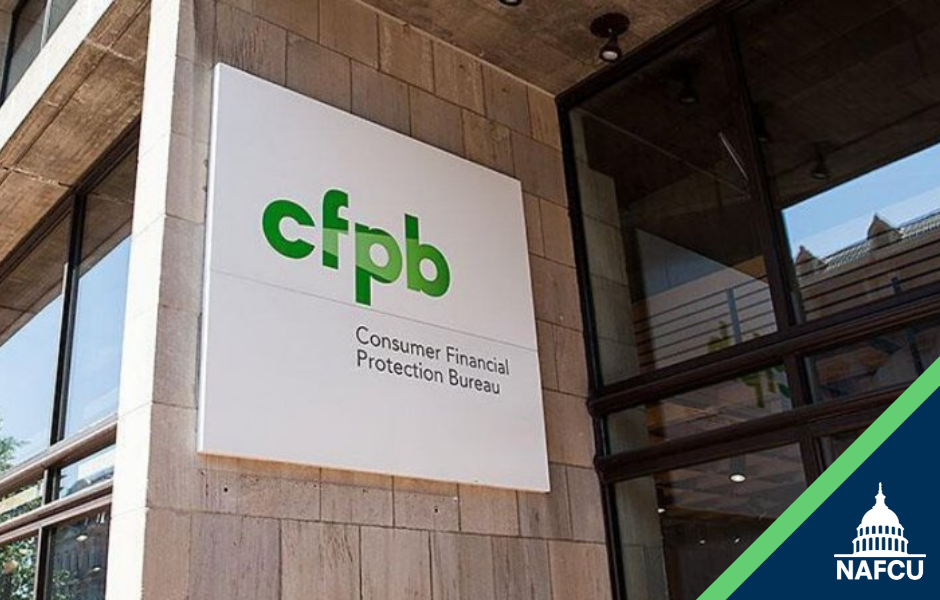Newsroom
NAFCU writes to House on CFPB reform; GAO releases report on fintechs

Ahead of today’s House Financial Services Subcommittee on Financial Institutions and Monetary Policy hearing on CFPB reform, NAFCU Senior Vice President of Government Affairs Greg Mesack explained that the bureau’s regulations have significant impacts on the credit union industry and many are ripe for reform. Relatedly, the U.S. Government Accountability Office (GAO) released a new report on fintechs, highlighting the need for regulatory clarity from the CFPB.
Mesack suggested several approaches to reforming some of the most important CFPB-related issues affecting credit unions right now, including:
- utilization of the bureau’s small entity exemption authority to recognize the unique nature of and constraints faced by the credit union industry;
- close scrutinization of any CFPB regulatory and supervisory activity related to fees, including the bureau’s alleged authority to make changes to its regulatory framework to limit the fees described in its request for information on the state of the consumer credit card market;
- reforming the structure of the CFPB from a single director to a bipartisan commission;
- CFPB adoption of common sense definitions, right-sized thresholds, and a reasonable, phased mandatory compliance schedule for the implementation of Section 1071 of the Dodd-Frank Act;
- Fairness on Regulation E dispute resolutions and oversight from Congress to ensure the CFPB creates a fair landscape between credit unions, fintechs, and other companies engaged in financial services;
- coordination with the NCUA and other regulators to ensure the availability of credit union services, competition within the financial services marketplace, and security of member data are not negatively impacted amid the implementation of Section 1033 of the Dodd-Frank Act;
- better coordination between the CFPB and NCUA examiners to limit exam burden and streamline processes and procedures; and
- additional guidance and resources on unfair, deceptive, or abusive acts and practices (UDAAP) compliance due to unclear standards and the unpredictability of enforcement.
In addition, Mesack suggested the CFPB utilize its authority under the Dodd-Frank Act to oversee a grossly under-regulated industry of fintech companies that offer consumers a wide array of products and services digitally, across state lines, ranging from mortgage servicing to mobile payments and peer-to-peer lending.
“The CFPB should exercise its authority over larger participants in the consumer financial markets, much in the same way it did in the 2012 final rules for larger participants of the markets for consumer reporting and consumer debt collection,” wrote Mesack. “Should the bureau conclude its ‘larger participant’ authority in the Dodd-Frank Act does not authorize it to issue rulemakings and conduct examinations for fintech companies, then NAFCU would urge support for a legislative amendment to the Dodd-Frank Act to explicitly provide such authority.”
NAFCU was among groups interviewed by the GAO for its fintech report; the association’s data on credit union/fintech partnerships was also referenced. The report noted that while fintech products may offer benefits to underserved consumers – such as those without bank accounts or credit scores – they can also pose significant risks. The report noted continued uncertainty regarding supervisory authority over fintechs and that further regulatory clarification is needed.
Through the report, GAO specifically recommends the CFPB issue clarification on the application of the Truth in Lending Act’s definition of “credit” for earned wage access to products not covered by its November 2020 advisory opinion. View highlights from the report.
NAFCU will monitor the hearing, slated to begin at 10 a.m. Eastern, and will remain in close contact with the CFPB to ensure credit unions can effectively serve their 135 million members.
Share This
Related Resources
Add to Calendar 2024-06-26 14:00:00 2024-06-26 14:00:00 Gallagher Executive Compensation and Benefits Survey About the Webinar The webinar will share trends in executive pay increases, annual bonuses, and nonqualified benefit plans. Learn how to use the data charts as well as make this data actionable in order to improve your retention strategy. You’ll hear directly from the survey project manager on how to maximize the data points to gain a competitive edge in the market. Key findings on: Total compensation by asset size Nonqualified benefit plans Bonus targets and metrics Prerequisites Demographics Board expenses Watch On-Demand Web NAFCU digital@nafcu.org America/New_York public
Gallagher Executive Compensation and Benefits Survey
preferred partner
Gallagher
Webinar
Add to Calendar 2024-06-21 09:00:00 2024-06-21 09:00:00 The Evolving Role of the CISO in Credit Unions Listen On: Key Takeaways: [01:30] Being able to properly implement risk management decisions, especially in the cyber age we live in, is incredibly important so CISOs have a lot of challenges here. [02:27] Having a leader who can really communicate cyber risks and understand how ready that institution is to deal with cyber events is incredibly important. [05:36] We need to be talking about risk openly. We need to be documenting and really understanding what remediating risk looks like and how you do that strategically. [16:38] Governance, risk, compliance, and adherence to regulatory controls are all being looked at much more closely. You are also seeing other technology that is coming into the fold directly responsible for helping CISOs navigate those waters. [18:28] The reaction from the governing bodies is directly related to the needs of the position. They’re trying to help make sure that we are positioned in a way that gets us the most possibility of success, maturing our postures and protecting the institutions. Web NAFCU digital@nafcu.org America/New_York public
The Evolving Role of the CISO in Credit Unions
preferred partner
DefenseStorm
Podcast
AI in Action: Redefining Disaster Preparedness and Financial Security
Strategy
preferred partner
Allied Solutions
Blog Post
Get daily updates.
Subscribe to NAFCU today.
